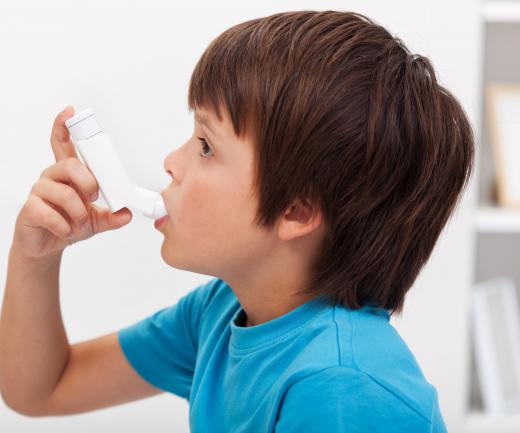Sulfur emissions are gasses released into the atmosphere by power plants, factories, and motor vehicles. The primary component of these emissions is the chemical, sulfur dioxide, a colorless, nonflammable compound used in various industrial procedures, though it is also produced naturally by volcanoes. It is extremely irritating to humans, whether in gas or liquid form.
Sulfur dioxide is often used in wine making as an insecticide, a preservative, and as an anti-microbial disinfectant. It is also used as a dried fruit preservative, a refrigerant, a reduction or bleaching agent, a laboratory solvent, and in the production of sulfuric acid. Since sulfur dioxide is toxic in large quantities, it should always be handled by a professional, such as a doctor, scientist, or laboratory technician. If directed to use it within a classroom setting, a student should follow his or her professor's directions closely, when handling this potentially dangerous substance.

The combustion of petroleum and coal creates sulfur emissions, as they typically contain sulfur compounds. Since these compounds oxidize within the atmosphere, they can also react with water, creating acid rain. Both of these chemical reactions have been cause for health concerns, as their by-products are considered strong pollutants. They have been linked to heart attacks, asthma, and many other respiratory problems. Premature death has even been attributed to sulfur emissions.

These emissions have a strong environmental impact. The dark haze over many cities is often caused, in part, by sulfur emissions. The acid rain produced during chemical reactions between sulfur dioxide and water has been known to damage various ecosystems, including forests and farmlands. Some experts even warn that sulfur emissions are a greater danger than carbon emissions.

Some scientists claim that in a matter of weeks most of the sulfur in the atmosphere could essentially be eliminated by simply switching off all power plants. However, since the majority of emissions result from burning coal to produce electricity for human use, this solution is more difficult to implement than it seems. Nevertheless, scientists, in cooperation with governments worldwide, continue to work toward solving the problems that sulfur emissions create. Some proposed solutions include flue gas desulfurization, or chemically binding sulfur dioxide within power plants, using ferox as a fuel additive to lower emissions, and developing alternative energy sources, such as solar power.

